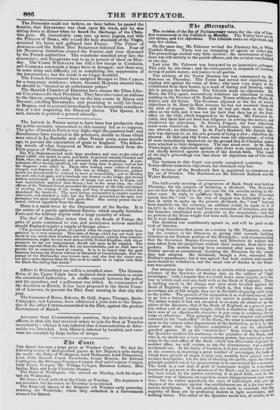The harvest in France seems to have been less productive
than the public accounts transmitted to this country led us to suppose. The price of bread in Paris is very high—fqd. the quartern loaf; and disturbances have occurred in the provinces, similar to those which were raised in La Rochelle and other French ports, some months ago, to prevent the exportation of grain to England. The follow- ing details of what happened at Mans are abstracted from the Paris papers of Wednesday— The War Department had made large purchases, and corn to the value of about 1,2001. was loaded in carts, and about to proceed towards Chartres and Paris, when the mob gathered, and prevented the carts proceeding. A com- missariat-officer having interfered, was near being torn in pieces; and at last the dragoons were called in. These, after bearing some vollies of stones, charged, and dispersed the mob. This was on Sunday. However, neither horses nor drivers could be induced to move on immediately; and on Monday the mob collected again, and a barricade was formed on the bridge, and several soldiers maletreated. A reinforcement of troops was sent for to Tours, and were immediately marched from thence ; hut, in the mean time, the chief officers of the National Guard persuaded the peasantry of the folly and danger of awaiting the coming of the troops, and they in consequence retired and abandoned the barricade. The more furious reassembled in smaller numbers afterwards, and attacked a mill ; but the Prefect proceeded to the spot, and persuasion was again employed with good effect. One unruly person was ar- rested, without opposition from the others.
Mans is a small town in the Department of the Sarthe. It is the centre of a purely agricultural district, which usually furnishes Paris and the military depots with a large quantity of wheat.
The Sad of Marseilles states that in the South of France the price of grain continued to rise, and anticipates serious mischief should England require a supply of foreign corn— "The general dearth of grain, at a period when the crops have scarcely been gathered in, is very ominous. This state of things, which has not been pro- duced by any orders from England, and which proceeds entirely from domestic circumstances, might become more serious if the United Kingdom, with whose prospects we are yet unacquainted, should call upon us for supplies. The arrivals expected from the Black Sea are inconsiderable, and we shall have to provide for an extensive tract of country. It is to be hoped that the good harmony between the Powers will not be disturbed at Constantinople, that the passage of the Dardanelles may remain open ; and also that the winter may not prove more rigorous than the last, so as to enable us to export corn from the Black Sea during that season."


























 Previous page
Previous page